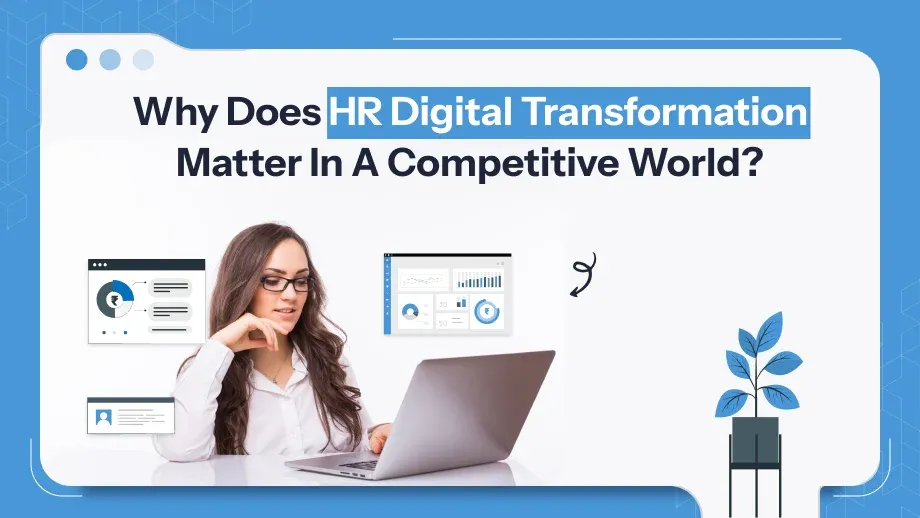
The world of people management for businesses is very fast-moving. Present-day technology has rendered traditional processes of HR way outdated. It is, therefore, that digital transformation in HR becomes crucial. It’s about using smart tools and technology, like HRM software for small business, to make HR faster, simpler, and more effective. Imagine freeing up boring tasks, smarter hiring decisions, and giving your people exactly what they need to grow—all in the process of saving time and money. That’s what HR digital transformation does. Whether you are managing a small business or managing a large team, leveraging HRM software for small business can help you stay ahead of the game and create a workplace that works better for everyone.
What is HR Digital Transformation?
HR digital transformation is the infusion of digital technology into all aspects of human resource management. This means a shift away from traditional and manual HR practices toward more automated, data-driven approaches. It helps simplify HR operations and improve employee experience while aligning HR functions with the overall goals of the business.
The very meaning of human resources transformation is to make the processes related to HR more efficient and future-ready. That includes tools like the best hrms solutions, AI-powered recruitment platforms, and real-time performance analytics. Finally, HR digital strategy develops businesses’ adaptation capability in a competitive and fast environment.
Benefits of HR Digital Transformation
Automation of Routine Tasks
Payroll processing, tracking of attendance, compliance reporting, and so on become much more efficient with automation. As such, attendance management system software gains higher accuracy. Valuable time for the HR teams is saved.
Enhanced Recruitment
HR digital solutions have been able to screen candidates, automate job postings, and track applications due to AI. Speedier, smarter hiring decisions are pulled out, and the overall talent acquisition process can be improved.
Improved Employee Engagement
Self-service portals and real-time feedback systems empower employees, increase satisfaction, and enhance productivity. Digital tools ensure that employees feel more connected and valued.
Data-Driven Decision-Making
Digital transformation human resources brings advanced analytics to the forefront. Predictive analytics help HR teams identify trends, make informed decisions, and optimize workforce planning.
Scalability and Flexibility
Whether you’re a startup or a large enterprise, cloud based HRMS software allows your HR systems to scale with your business. This adaptability is crucial in today’s dynamic market.
HR Role in Digital Transformation
HR plays a vital role in digital transformation by handling change, reskilling and upskilling employees, and improving the employee experience. Championing change in HR teams leads to the successful implementation of new technologies by engaging employees in proper communication and offering training. The HR team determines the skill gap and initiates development programs that will prepare the workforce for the digital-first environment.
HR also aligns digital strategies with business objectives by integrating various tools, such as cloud-based HRMS software and attendance management system software, which streamline processes and build efficiency. HR leverages workforce analytics to deliver actionable insights for making better decisions and fostering a culture of innovation for employees to lead changes in supporting the success of the organization in such a competitive digital landscape.
HR Digital Transformation Challenges
While the benefits of HR digital transformation are numerous, the challenges associated with it cannot be ignored. As a matter of fact, organizations looking to integrate digital solutions in their HR functions must be aware of the obstacles they might face. The following are some of the common challenges that many organizations experience:
Resistance to Change
One of the biggest challenges when implementing HR digital solutions is employee and management resistance. People generally fear the unknown, are afraid of losing their jobs, or just do not like change. To overcome this, businesses require clear communication, training, and consistent support in showing how this transformation benefits everyone.
Integration Issues
Integrating new digital tools with existing systems can be a complex task. Many organizations face challenges when trying to align modern HR digital solutions with legacy software. Ensuring compatibility and data migration without losing critical information requires careful planning and the right technology partners, such as the best human resource management system software.
High Implementation Costs
Implementing HR digital transformation can require significant upfront investment. Costs for purchasing software, customizing solutions, and training employees can add up quickly. However, businesses should focus on the long-term ROI, as automation and efficiency often offset these initial expenses.
Lack of Skilled Workforce
Adopting digital HR systems requires technical know-how. Many HR teams lack the skills to manage and utilize new technologies effectively. Organizations need to invest in training programs to bridge this gap and ensure smooth adoption.
Data Security and Privacy Concerns
Since HR systems contain private employee data, such as personal and financial information, vulnerabilities in these systems may lead to significant data breaches. Due diligence should thus be taken in selecting cloud-based HRMS software or any other technology that complies with high-security standards to protect the information.
Overwhelming Technology Choices
The market is flooded with different HR digital solutions, ranging from attendance management system software to employee onboarding software. It becomes overwhelming to select the right tools that align with business needs. Companies need a clear HR digital strategy to make informed decisions.
Cultural Barriers
Digital transformation often involves shifting workplace culture to embrace technology. Some organizations struggle to create a culture that supports innovation and collaboration. Addressing these cultural barriers is essential for a successful transition.
Measuring Success
Measuring the organizational impact of digital transformation of human resources might pose a challenge because if the bottom line results associated with new tools and strategies implemented are not traceable, there will be limited means to describe whether or not they are effective enough towards meeting expectations for delivery. Setting KPIs and reviewing progress regularly makes sure that the transformation is on course.
How to Create Your HR Digital Transformation Strategy?
- Assess Your Needs
Identify areas for improvement in your current HR processes. For instance, if recruitment is a pain area, then consider employee onboarding software.
- Set Clear Goals
Define what one wants to deliver in HR such as decreased employee turnover, accelerated recruiting, or simply compliance.
- Choose the Right Tools
Select technologies that align with your goals. Solutions like the best HRMS solutions and human resource management tools can address specific challenges.
- Engage Stakeholders
Gain buy-in from leadership and involve employees in the transformation process to ensure smooth adoption.
- Prioritize Training
Train your HR team to use new digital tools effectively, empowering them to maximize the benefits of transformation.
Why Should You Start Digitalization For Your Business?
The business world is becoming increasingly digital, and HR is no exception. Starting HR digital transformation ensures that your organization stays competitive by:
- Improving Operational Efficiency: Automation reduces manual tasks, freeing up time for strategic activities.
- Enhancing Employee Experiences: Digital tools foster engagement and satisfaction.
- Boosting Competitiveness: Companies adopting HR digital solutions often outperform those that don’t.
8 Steps to Take for HR Digital Transformation
It can be intimidating to start a journey of digital transformation for HR, but the right strategy can make it worthwhile for your organization. Digital transformation rewrote the whole operations of HR-from making the processes more efficient to improving employee engagement. Here are 8 steps that will guide you through this transformative process.
Audit Your Current HR Processes
To make changes first comes understanding the reasons behind those weaknesses. In other words, audit current HR processes in their weak and ineffective bottlenecks to payroll processing, attendance monitoring, recruitment process, and compliance to form a foundational framework of the digital HR strategy.
Define Clear Objectives
Clearly define and make measurable your HR digital transformation objectives. Do you want to reduce the time spent in recruiting, improve employee engagement, or automate payroll? This will enable you to choose the right tools for your transformation efforts and measure success.
Choose the Right Technology
Select digital tools that align with your goals and business needs. For example:
These tools ensure that your HR department becomes more efficient and data-driven.
Secure Leadership Buy-In
It needs commitment from the top. Present the benefits of hr digital solutions to leadership, focusing on how it can save time, reduce costs, and improve workforce management. Gaining their support ensures adequate resources and smooth implementation.
Involve Your HR Team
The role of HR teams in the successful implementation of digital transformation cannot be overemphasized. Engage them in the planning and implementation stages to address concerns and gather useful input. Give them training on new tools to ensure your team is equipped with the knowledge and skills to apply them effectively.
Engage Employees
Employees are at the center of any HR digital transformation. Keep them informed about the changes and explain how the transformation will benefit them, such as through easier access to payslips or faster leave approvals. This transparency reduces resistance and encourages adoption.
Implement in Phases
Instead of a complete overhaul of all HR planning process, implement changes in phases. Start with the area that would have the most drastic impact, such as payroll automation or recruitment. The gradual implementation would ensure little disruption and then help in rectifying problems more effectively.
Monitor and Optimize
Transformation does not end after the implementation. Use analytics and feedback to measure your new tools and processes and to monitor performance. Identify what’s working, adjust where needed, and know continuous improvement ensures the long-term success of HR digital solutions.
Set up Your Business for HR Digital Transformation and Trends
Embracing hr digital solutions prepares your business for future trends in workforce management. Key trends include:
- AI-HR Tools are changing the dynamics of recruitment, performance management, and employee engagement.
- Cloud-based solutions for Remote Workforce Management will enable easy work processes for any distributed team
- Data-driven HR Decisions, thanks to AI analytics, allow HR teams to make more informed decisions.
Investing in HR digital solutions like the best HRMS tools positions your business to stay competitive and future-ready.
Conclusion
HR digital transformation is no fad but an imperative for businesses to achieve success in this fast-paced competitive world. The rapid pace of technological advancements and changing workforce requirements necessitate that organizations move towards digitalization to optimize their HR operations. With the best HRMS and payroll software in India and an effective HR digital strategy, companies can transform their HR departments into efficient, data-driven, and employee-centric hubs.








